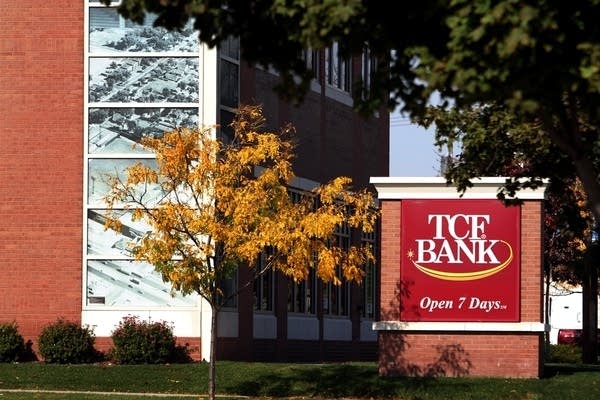Amid fight with TCF, Fed relents on debit fees
Go Deeper.
Create an account or log in to save stories.
Like this?
Thanks for liking this story! We have added it to a list of your favorite stories.

WASHINGTON - Retailers and banks in Minnesota are unhappy with the Federal Reserve Board's new cap on swipe fees for debit cards -- the fees merchants pay for debit card transactions.
The Fed today set rules that would generally allow for a maximum fee of about 21 cents for an average debit card transaction. That's up from the original proposal of 12 cents, which sent banks and big payment processors like Visa and Mastercard to convince the Fed was too low to cover the cost of handling transactions, maintaining networks and preventing fraud. Retailers complain the cap is still too high. Banks lament it's too low.
Banks currently have no limit and charge an average of 44 cents per swipe.
TCF Bank spokesman Jason Korstange said the new maximum fee won't cover the bank's cost of providing debit card services to merchants and consumers.
Turn Up Your Support
MPR News helps you turn down the noise and build shared understanding. Turn up your support for this public resource and keep trusted journalism accessible to all.
"It's still below our cost. We still have that as a problem. You don't make it on volume. When you're losing a little bit on each one you don't make it up on volume," Korstange said. "We still think it's unconstitutional to do something like that. But all we can really say on that is it's better than it was."
TCF also learned today that the U.S. 8th Circuit Court of Appeals in St. Louis has rejected the bank's request to block the debit fee cap while the banks lawsuit against the Fed plays out.
The Fed voted 4-1 to adopt the rule, which was required under the financial regulatory law enacted last year. Gov. Elizabeth Duke opposed the rule. It takes effect Oct 1, later than expected.
It was "one of our most challenging rulemakings" under the financial regulatory law, Fed Chairman Ben Bernanke said Wednesday. He said the Fed will monitor developments in the debit card market "on an ongoing basis" to gauge if it's accomplishing the intended goals.
Fed staff said the higher cap reflects a broader range of costs incurred by banks that issue debt cards. The rule will also allow banks to charge a fraction more to cover the costs of fraud prevention.
It does not apply to government-issued debit cards, prepaid cards or cards issued by banks and credit unions with assets under $10 billion.
The move to limit swipe fees pitted the nation's largest banks and payment processors like MasterCard Inc. and Visa Inc. against Wal-Mart and retailers of all sizes. The decision to settle on a higher cap lifted bank and payment processors stocks in late afternoon trading on Wall Street.
Banks said roughly $16 billion was at stake if the 12-cent cap took effect. That would be more than 80 percent of the $19.7 billion in debit transaction fees paid by merchants in 2009, according to the Nilson Report, which tracks the payments industry.
The banks warned that they would have to make up for some revenue lost by shifting costs to consumers. Many already eliminated unrestricted free checking accounts, and some ended debit card rewards programs. Other potential actions include annual fees for using debit cards, which are already being tested in some markets.
The higher cap may lead some to avoid taking such action, said Brian Riley, a bank card analyst with the consultant The Tower Group. Banks must still review their costs but the rule allows them to avoid a "slash and burn" process for customers that don't provide much profit, he said.
Merchant groups said that their savings would be passed on to customers in the form of lower prices. But many questioned whether retailers would simply pocket the difference.
Staff members said they think it's unlikely that issuers would impose fees on debit card transactions or steer their customers away from using the cards. Merchants in highly competitive regions would likely reduce their prices once fees go down, the staff members said.
Small banks and credit unions argued that the exemption for banks under $10 billion wouldn't help if the cap was as low as originally proposed. That's because it would have invited merchants to discriminate against higher cost cards. Bernanke had acknowledged small banks' concerns in testimony before the Senate last month.
"It certainly appears that the board gave our concerns some consideration," said Mary Dunn, deputy general counsel of the Credit Union National Association.
Separately Wednesday, a federal appeals court in South Dakota ruled that a lower court judge was correct to deny a preliminary injunction against the fee limits taking effect.
The case challenging the regulations' constitutionality was brought in October by Minnesota-based TCF National Bank, the unit of TCF Financial Corp., considered the first bank to offer free checking accounts. TCF is among the banks that no longer offer free checking without requirements such as using direct deposit or maintaining minimum balances.
In a twist, TCF's attorneys argued that the provision of the law exempting small banks and credit unions gave those unaffected banks an unfair advantage.
----- Compiled from MPR and Associated Press reports.




